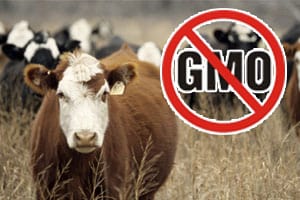
The U.S. Department of Agriculture (USDA) just approved a label for meat and liquid eggs that will allow for information indicating the products do not contain genetically engineered products. This represents the first time that the Agriculture Department has approved a non-GMO label claim, according to the New York Times. The label would attest that […]
 The U.S. Department of Agriculture (USDA) just approved a label for meat and liquid eggs that will allow for information indicating the products do not contain genetically engineered products.
The U.S. Department of Agriculture (USDA) just approved a label for meat and liquid eggs that will allow for information indicating the products do not contain genetically engineered products.
This represents the first time that the Agriculture Department has approved a non-GMO label claim, according to the New York Times. The label would attest that the meat was certified by the Non-GMO Project and came from animals that never ate feed containing genetically engineered foods, such as corn, soy, and alfalfa.
The USDA’s Food Safety Inspection Service (FSIS) “allows companies to demonstrate on their labels that they meet a third-party certifying organization’s standards, provided that the third-party organization and the company can show that the claims are truthful, accurate and not misleading,” Cathy Cochran, a USDA spokeswoman, said in a statement to the Times. Cochran also said that the labeling approval did not indicate “any new policy regarding non-G.E. or non-G.M.O. products.”
Increasingly, companies have been voluntarily labeling their products. In fact, the Times noted that the restaurant chain, Chipotle, now points out which of its items contain genetically engineered ingredients on its online menu. Yet, GMO indications have become a contentious issue in the food business. Some two-dozen states are still pending on a decision regarding labeling requirements and the biotech industry has been fighting against GMO labeling with intense lobbying.
Many consumers strongly object to consuming GMO foods and have long sought meat from animals that are non-GMO fed, such as certified organic meats. Mindful Meats submitted a label last year with the Non-GMO Project’s certification seal; however, the FSIS rejected the labeling. “It turned out that the USDA’s Food Safety Inspection Service had not yet created a rule for handling non-GMO claims for meat and poultry products, so they just denied us,” Claire Herminjard, founder and chief executive of Mindful Meats, which makes meat products from organic dairy cows, told the Times.
When Herminjard found out that Hidden Villa Ranch and Pitman Farms also sought to use the non-GMO labeling on their products, they collaborated, according to the Times. The USDA took a look at the Non-GMO Project’s standards, requirements, and auditing processes before it approved the new labeling. “It has to approve every single label that goes out into commerce, but this sets a precedent for other meat and poultry companies that want to label this way,” Herminjard told the Times.
The issue of genetically modified (GM) crops, and the animals fed those crops, is gaining traction. A new study revealed some potential health problems associated with GM crops and involved a study conducted with Australian scientists and United States researchers. A group of 168 newly weaned pigs were studied with half fed a diet of GM corn and soy grain; the other, conventional feed. The researchers found that pigs fed a diet of GM grain had significantly increased stomach inflammation when compared to the pigs who consumed conventional feed and GM-fed females pigs’ uteri measured at 25 percent heavier than non-GM fed pigs. That study appeared in this month’s issue of the peer-reviewed Journal of Organic Systems.
GM crops are used in the U.S., Latin America, and other countries and biotech seeds are altered genetically to grow into crops that have a high tolerance for herbicides and pests. Critics say that the DNA changes that create the so-called “transgenic plants,” created from DNA from other bacteria and species, also creates new proteins that can lead to the digestive issues seen in this study. These adverse health effects could potentially occur in humans who consume these crops, Reuters noted.
We also previously wrote that another study linked GM corn to cancer in rats. That study found that rats fed a diet of Monsanto’s GM corn, or who were exposed to Monsanto’s Roundup weed killer, suffered from tumors and multiple organ damage, according to a French study, wrote Reuters previously. The lead researcher for this study has a reputation for being an industry critic, which is expected to spark even more controversy over GM food crops.


